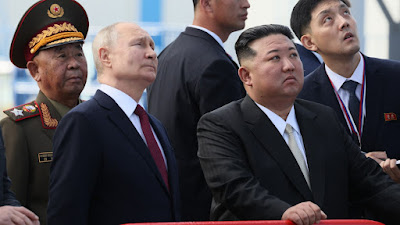North Korea is girding itself for war,
and continuing with the current policy of strategic deterrence will put the
U.S. and its allies on collision course with the isolated regime in the coming
years, experts warn in a new report.
North Korean Supreme Leader Kim Jong Un "has made a strategic decision to
go to war," according to researchers at 38 North, part of foreign affairs
think tank the Stimson Center. In a January 11 report, the North Korea-focused analysis group said the situation
on the Korean Peninsula is now more dangerous than it has been at any point
since the Korean War.
Inter-Korean relations continue to deteriorate, strained by
reciprocal launches of surveillance
satellites , North Korea's steadily progressing nuclear and ballistic missile
programs, joint U.S.-Japan-South Korea military drills, and the abandonment of
a key North-South military agreement reached in 2018 to lessen the risk of
hostilities.
North Korea on Monday announced it had test- fired a solid-fuel missile tipped with—in a first for the
nuclear-armed state—a hypersonic warhead Sunday, drawing condemnation from Washington, Seoul and Tokyo. In a trilateral
call they said this had "violated multiple U.N. Security Council
resolutions" and vowed to step up joint-security to defend against the
North Korean threat, per a U.S. State Department media note.
The missile, bearing a hypersonic payload Pyongyang says
can be maneuvered through the atmosphere to strike targets, raised alarm bells
as it flew 620 miles before landing in waters between the Korean Peninsula and
Japan, South Korea said.
Newsweek reached out to the North Korean embassy in Bejing and the
U.S. State Department with requests for comment.
"We do not know when or how Kim plans to pull the
trigger, but the danger is already far beyond the routine warnings in
Washington, Seoul and Tokyo about Pyongyang's 'provocations,'" the
analysts said.
Pyongyang said the latest launch was routine and unrelated to regional tensions... It comes amid a significant shift in messaging from Kim's regime.
In a historic move, North Korea's rubber-stamp congress
announced Monday it was abolishing
three bodies related to inter-Korean cooperation and abandoning reconciliation
with its neighbor, state outlet the Korean Central News Agency reported.
In addition, a statement said the North's constitution will
be modified to define Seoul as Pyongyang's "principal enemy."
"We are disappointed by the DPRK [North Korea's]
continued rejection of dialogue and the escalation of its hostile rhetoric
towards the ROK [South Korea]," a U.S. spokesperson said, per South Korean
media agency Yonhap.
The spokesperson said the U.S. "harbors no hostile
intent toward the North" and reiterated Washington's stance that
North-South cooperation is vital to "lasting peace on the Korean
Peninsula."
Security analyst Sean King of consultancy Park
Strategies previously told Newsweek : "I can't get inside Kim Jong
Un's head, but what I think…is not that he's against unification per se but
that he realizes he won't get where he wants to on it so long as a conservative
like [President] Yoon Suk Yeol is leading the South."
Analysts at 38 North believe North Korea's recent actions
follow what Kim saw as the ultimate failure of efforts by him and his father,
former leader Kim Jong Il, to obtain legitimacy from Washington.
Then-President Donald Trump 's rejection of Kim's requests at their Hanoi Summit in 2019 solidified a decisive shift in Pyongyang's Washington policy they said. This reevaluation of its engagement with the U.S. became evident in 2021 as the country came to view the U.S. as a declining power and doubled down on efforts to draw closer to China and Russia.
Alleged military exchanges between North Korea and Russia
have raised global concerns.
North Korea is accused of providing Moscow with ballistic
missiles for its war in Ukraine in exchange for advanced weapons and
technological expertise. In a January 9 joint-statement, U.S. Secretary of State Antony Blinken , EU foreign policy chief Josep Borrell, and foreign ministers
from over 40 countries condemned the alleged weapons transfers.
The 38 North analysts cautioned against relying too heavily
on the assumption deterrence is a successful framework for engaging with North
Korea.
While the consensus in Washington is that deterrence is
working, a November report by the Atlantic Council think tank argued the policy
in its current form is unlikely to hold up in the coming years.
The study identifies potential scenarios that could result
from a failure of deterrence, though a full-scale North Korean attack to
reunify the Korean Peninsula is among the least likely of these, it said.
The Atlantic Council warned against responding to North
Korean escalations with concessions, as this could undermine deterrence and
fuel a high-risk pattern by emboldening Kim.
Additionally, North Korea's increasingly precise and
capable weapons lead to confidence in his second-strike nuclear
response capabilities, increasing the regime's confidence in surviving a U.S.
counterattack.
The report also emphasized the need
for the South Korean military to adopt a more flexible posture and organization
to address North Korean offensives that fall between provocations and
full-scale war.
-by Micah McCartney, Newsweek


No comments:
Post a Comment
Note: Only a member of this blog may post a comment.